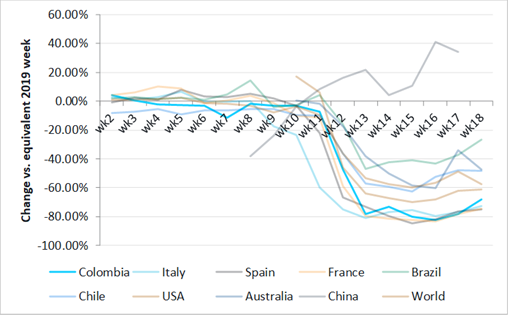In Colombia, Steer has been appointed by one of the multilateral banks to assist the National Government in defining a strategic plan to mitigate the impacts of the pandemic on the infrastructure and transport sector. As in many other countries worldwide, the lockdown has slowed down the economy and reduced passenger and cargo levels in all systems. National and regional authorities, as well as operators, have introduced emergency measures to reduce load on vehicles, as well as other actions to prevent virus spread; therefore costs remain close to normal, but revenue has decreased.

* Average on selected assets per country.
The purpose of this study is to identify upstream, and downstream high-level risks of the lockdown and other measures implemented by the government on urban public transport, PPP road schemes, and logistics and freight concessions. The assignment comprises an analysis of the crisis and its impacts through reviewing information reported by national entities, mass transit authorities, and transport operators. It also includes identification and compilation of policy measures, including short-term regulation and long-term actions proposed after the emergency was officially declared by the Government of Colombia.
The scope covers the examination of supply and demand variations, and a review of future financing of projects and multimodal networks comprising public transport, roads, airports and ports.
Based on the analysis of the crisis and its effects, the study will result in complementary actions to mitigate residual risks and carry out high-level estimates of medium and longer-term fiscal impacts under different scenarios. These projections will be based on local and international third-party analysis regarding the emergency, and the outlook on Colombian economic, financial and fiscal fluctuations.
The output will include an exit strategy plan to reverse the mitigation measures as the lockdown is lifted, to be carried out once the economy returns to a Business as Usual situation.

